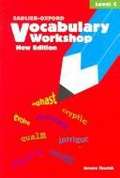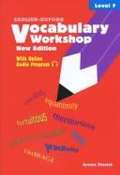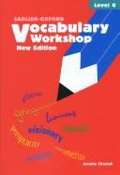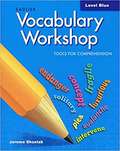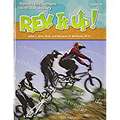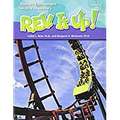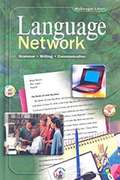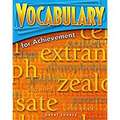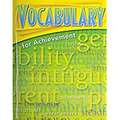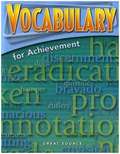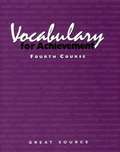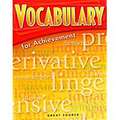- Table View
- List View
Vocabulary Workshop, with iWordsTM Audio Program, Common Core Enriched Edition, Level Red
by Jerry L. JohnsA publisher-supplied textbook
Vocabulary Workshop: Level C (New Edition)
by Jerome ShostakPrepare students for the new standardized tests and teach 300 essential vocabulary words per level.
Vocabulary Workshop: Level D (Enhanced Edition)
by Jerome ShostakFor close to five decades VOCABULARY WORKSHOP has been a highly successful tool for guiding and stimulating systematic vocabulary growth for students. It has also been extremely valuable for preparing students to take the types of standardized vocabulary tests commonly used to assess grade placement, competence for graduation, and/or college readiness. Th Enhanced Edition has faithfully maintained those features that have made the program so beneficial in these two areas, while introducing new elements to keep abreast of changing times and changing standardized-test procedures, particularly the SAT.
Vocabulary Workshop: Level F (New Edition)
by Jerome ShostakPrepare students for the new standardized tests and teach 300 essential vocabulary words per level.
Vocabulary Workshop: Level G (New Edition)
by Jerome ShostakThis text prepares students for the new standardized tests and teaches 300 essential vocabulary words per level.
Vocabulary Workshop®: Tools for Comprehension, Level Blue
by Jerome Shostak Joseph Czarnecki Christine GialamasA publisher-supplied textbook
Vocabulary Workshop®: Tools for Comprehension, Level Green
by Joseph Czarnecki Christine GialamasA publisher-supplied textbook
Vocabulary Workshop®: Tools for Comprehension, Level Orange
by Jerome Shostak Joseph Czarnecki Christine GialamasA publisher-supplied textbook
Vocabulary Workshop®: Tools for Comprehension, Level Purple
by Joseph Czarnecki Christine GialamasA publisher-supplied textbook
Vocabulary Workshop®: Tools for Comprehension, Level Red
by Sadlier SchoolA publisher-supplied textbook
Vocabulary [Level D]
by Isabel L. Beck Margaret G. Mckeown Eldon Doty Jared Lee Bradley SlocumNIMAC-sourced textbook
Vocabulary [Level E]
by John M. Martinko Isabel L. Beck Margaret G. Mckeown Wayne Alfano Judith LoveNIMAC-sourced textbook
Vocabulary and Spelling Book (Grade #8)
by Mcdougal LittellThe Vocabulary and Spelling Book contains lessons designed to help you understand and remember important vocabulary skills and strategies. You will often need to use basic reference sources to master these new techniques and to complete the exercises within the book.
Vocabulary for Achievement (1st Course)
by Margaret Ann RichekDefinitions for the three hundred words are taught in this textbook. This book guides students on how to use the dictionary, pronounce words and improve their vocabulary.
Vocabulary for Achievement (2nd Course)
by Margaret Ann RichekDevelops a student's skills in dictionary, thesaurus, speech, vocabulary, proverbs, idioms and multiple meanings.
Vocabulary for Achievement (3rd Course)
by Margaret Ann RichekThe book contains definitions and pronunciations of hundreds of words. The book guides how to use dictionary and taking tests. It is a very useful and resourceful book.
Vocabulary for Achievement (4th course)
by Margaret Ann Richek Arlin T. Mcrae Susan K. Weiler10th grade Vocabulary
Vocabulary for Achievement (Introductory Course)
by Margaret Ann RichekUpdated word lists to reflect current word usage and frequency. More reproducible tests and new sentence completion exercises to prepare students for the revised SAT - Context sentences for related forms of vocabulary words- New reading passages and activities to improve comprehension and apply lessons- Expanded teacher and student notes that make implementation easy.
Vocabulary for Success, Common Core Enriched Edition, Grade 10
by Douglas Fisher Nancy Frey Ernest MorrellA publisher-supplied textbook
Vocabulary for Success, Common Core Enriched Edition, Grade 6
by Douglas Fisher Nancy Frey Ernest MorrellA publisher-supplied textbook
Vocabulary for Success, Common Core Enriched Edition, Grade 6
by Douglas Fisher Nancy Frey Ernest MorrellA publisher-supplied textbook
Vocabulary for Success, Common Core Enriched Edition, Grade 7
by Douglas Fisher Nancy Frey Ernest MorrellA publisher-supplied textbook

